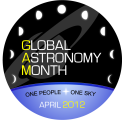GAM 2012 Blog
|
April 13 By Dr. Amelia Ortiz-Gil |
Back to the GAM Blog |  |
| Have you ever wondered what would the world look like if you suddenly lost one of your senses? Or if you could not walk or even move? |
||
I think much of what now seems to me easy would become difficult, challenging all the time: the world would even turn into quite a menacing place. And yet, some people overcome those difficulties day after day, bravely, showing to the rest of us that is not senses what matter, but ingenuity can take you far, far away… as far away as to make you reach for the stars, why not?
That is the idea behind the project of astronomy for people with disabilities that we started some years ago at the Astronomical Observatory of the University of Valencia in Spain. One of our main goals as an institution is the dissemination of astronomy. Many other do that, luckily. But then, we started to wonder how people with different disabilities would approach astronomy, using different abilities to those that we are used to employing all the time.
We started working with groups of cognitively disabled. For us it was literally like discovering a new world. We talked a lot with their caretakers to learn about them, what did they enjoy best, what to avoid, and then we were ready for the grand opening. We were a bit worried about the event. After all, we are located in a very formal building, surrounded by 'serious' scientists trying to unveil the secrets of the Universe. How would it be to have our special visitors with us?
The visit went extremely well, with the invaluable help of the caretakers, and at the end we were very impressed with them. They were extremely keen on listening to explanations and watching the images we had prepared. They asked questions, difficult questions. They enjoyed the workshop by building cardboard sundials and their favorite constellation with luminescent stars. Most of them needed help when cutting the cardboard, or drawing the constellation figure. The beautiful thing was how they worked together, helping each other as much as they could.
At the end of the activity they effusively gave us thanks for it, but I think it was us who learnt much more in that day about overcoming difficulties, collaborating, and sharing.
After that experience, we started to develop more activities, reaching for other disabilities. The Universe is there for everybody's enjoyment, so we set up to make as many people as possible to enjoy it. After all, that is one of the goals of our Observatory.
So far we have created a few tools, that are free for everyone to use. You can find them listed here (AWB link), among many others made by astronomy communicators with much broader experience and knowledge than ours.
But the most important thing of this work is not the tools we have or will create, but to inspire other people to do the same. Use your ingenuity to help everybody reach for the stars. We have developed these ones just to make the road a bit easier to those who are new to the field, there is so much we can do!!
If you happen to be an astronomy communicator, teacher, an amateur, or even a professional astronomer involved in astronomy dissemination, how about planning an astronomical event for the school of blind children you have around the corner? Or for the cognitive disabled daycare centre? Once you start you will not be able to stop.
|
|
Dr. Amelia Ortiz-Gil is an astronomer at the Astronomical Observatory of the University of Valencia, Spain. She is currently working as an Outreach and Public Officer. She coordinated the astronomical activities for disabled people of the Spanish node during the International Year of Astronomy in 2009. Dr. Ortiz-Gil is currently co-chair of AWB's Program for People with Disabilities. |








